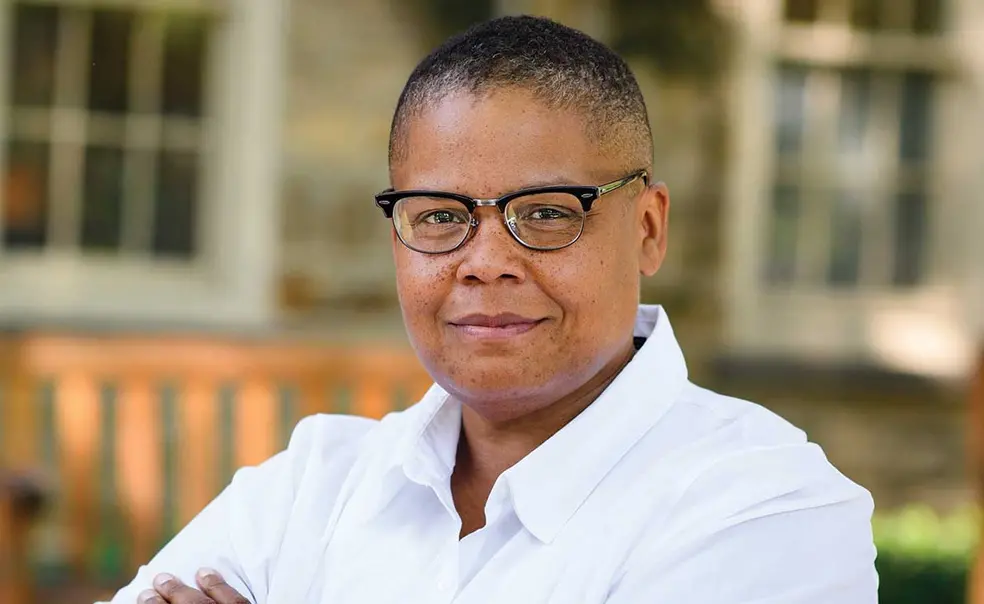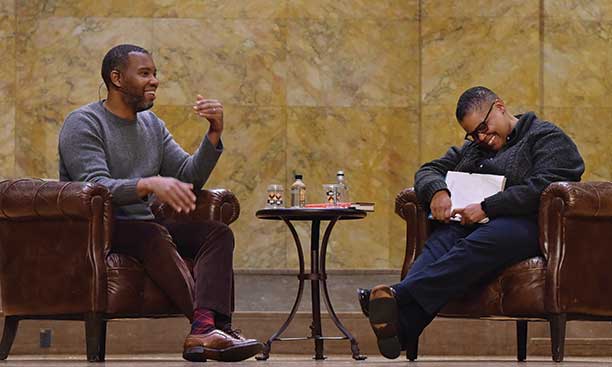Historian Keeanga-Yamahtta Taylor Is Questioning the Status Quo
Taylor analyzes racial inequalities, social movements, and Black politics
Historian Keeanga-Yamahtta Taylor did not set out to become an academic: She is a socialist who started as an activist and housing advocate who worked to delay evictions. But her curiosity eventually led her to research Black history, and she has become a prominent voice in the field.
A scholar on Black politics, social movements, and racial inequality in the United States, Taylor has written and spoken on topics including housing policy, the 2020 election, the Black Lives Matter movement (BLM), the pandemic, and the need for police reform. She has won prestigious awards for her work — including a MacArthur Fellowship (commonly known as the “genius grant”) in September, which includes a $625,000 unrestricted grant over five years. Taylor, a member of Princeton’s Department of African American Studies, was recognized for “analyzing the political and economic forces underlying racial inequality and the role of social movements in transforming society,” said the MacArthur Fellows press release.
“This award rightly recognizes Professor Taylor’s pathbreaking scholarship that has shaped our understanding of the Black Lives Matter movement and redefined how we think about the history of housing policy in this country,” Eddie Glaude Jr. *97, Princeton professor of African American studies and department chair, said in a University statement.
Taylor’s work throughout the past decade has foreshadowed many of the current tensions. Of course, she did not predict a pandemic — but she has been writing and talking about a growing frustration among a large swath of the population relating to inequalities that persist in America. It’s no surprise that these issues, including racial injustice, gender equity, and health-care access are boiling over during a crisis. Why? Taylor asks. “Simply because the issues were never resolved,” she says.
Taylor consistently questions the status quo. “What is the system in systemic racism that continues to return us to this point of conflict?” she asks. “Why can the U.S. not solve this problem of racism?” Focusing on these fundamental questions “moves it away from the kind of stilted discussion about hearts and minds, into structures and identifying the systems we are actually talking about,” she says.
Taylor, who was promoted to full professor earlier this year, began to develop her perspective early in life. She recalls hearing discussions on politics and race between her parents, who were both academics. She had access to Black news outlets. As a middle-school student in Dallas, she was bothered by the police presence in her predominantly Black and Latino school. That disciplinary environment continued when she moved to Buffalo, New York, for her final two years of high school. Over a Zoom call last summer from her home office in Philadelphia, where she lives with her wife and son, Taylor shared memories of going to a detention room in the basement filled with Black students. She spent homeroom period in the principal’s office as punishment for her refusal to say the Pledge of Allegiance.
These moments clarified for her the inequalities baked into our society. “By the time I got through this experience in high school, it was without question or doubt for me that it’s not enough to just be angry or disgusted by racism, but that you actually have to do something about it,” Taylor says.
Her work as a housing advocate in Chicago launched her desire to understand the racism and segregation she encountered daily in the city’s housing policies. Taylor focused on the subject for her dissertation at Northwestern University. That turned into one of her most influential works, Race for Profit: How Banks and the Real Estate Industry Undermined Black Homeownership, which was published in 2019, longlisted for a National Book Award, and became a Pulitzer Prize finalist in 2020.
Homeownership is a foundational part of the American dream and beneficial for capital gain, but in the book, Taylor connected the dots to explain the persistence of discriminatory practices in the housing market. Her analysis starts in the 1960s, when the government tried to partner with private agencies to address problems blocking African Americans from homeownership. Although laws like the Fair Housing Act, which prohibits discrimination when selling property, were put into place, Taylor argues that these laws are manipulated to continue excluding Black people and maintaining exclusively white neighborhoods.
She links these failures to the subprime mortgage crisis of the late 2000s, which hit Black homeowners particularly hard. Data show that gains in Black homeownership made since the late 1960s had virtually disappeared by 2017.
The conclusion “is not how do we continue in this race to nowhere to increasing the number of Black homeowners, but how do we deemphasize homeownership as the central means by which people establish a decent quality of life over the course of their lifetimes, instead of needing a home to secure a college education for your child, or to weather a financial crisis, or health-care crisis, or retirement. Those things should be guaranteed,” Taylor tells PAW.
“But awareness alone has never been enough to change these conditions, and now the hard work of moving from diagnosis to treatment is underway.” — Keeanga-Yamahtta Taylor
Since joining Princeton’s faculty in 2014, Taylor has researched and written on a variety of other topics. She was editor of a 2017 book about the Combahee River Collective, a Black, feminist, lesbian social organization active in the ’70s. After Michael Brown was shot and killed by a police officer in Ferguson, Missouri, Taylor published From #BlackLivesMatter to Black Liberation. In it, she analyzes the rise of BLM and its ties to the history of various socialist movements. Her work has appeared in publications ranging from Jacobin magazine, which offers readers a socialist perspective, to The New York Times, where she writes critiques of government, housing, and anti-Black policies.
In her writing and appearances, Taylor speaks plainly about her views of our society’s failures and what it might take to find solutions. She was a prominent advocate of Bernie Sanders’ campaigns for president. In 2017, Taylor received more than 50 threatening emails, including death threats, after Fox News ran a segment in which she called President Donald Trump a “racist and sexist megalomaniac” during a commencement speech at Hampshire College in Massachusetts.
Since the pandemic began, Taylor has continued to teach, organize, and write on social issues. In an August article for The New Yorker, where Taylor is a contributing writer and columnist, she reflected on the anniversary of the BLM protests that erupted in the summer of 2020. Her conclusion: Not enough has been done.
“The start of the pandemic last spring and then the summer’s protests worked like the contrasting dye used in MRI scans, highlighting all of the imperfections in the internal structures of the United States,” Taylor writes. “But awareness alone has never been enough to change these conditions, and now the hard work of moving from diagnosis to treatment is underway. We need new tools, including new organizations and strategies, that can actually deliver on the demands that brought so many into the streets last summer.”
This semester, Taylor is teaching “African American History to 1863” and is particularly excited to talk with her students about The New York Times’ 1619 Project on the history of slavery. She is also working on a book focusing on class and political divides within Black America after the civil rights movement.
Taylor’s socialist roots narrow her research to focus again and again on a fundamental point, she says. “We have to ask: How do we create a society that values the life of everyone?”













No responses yet